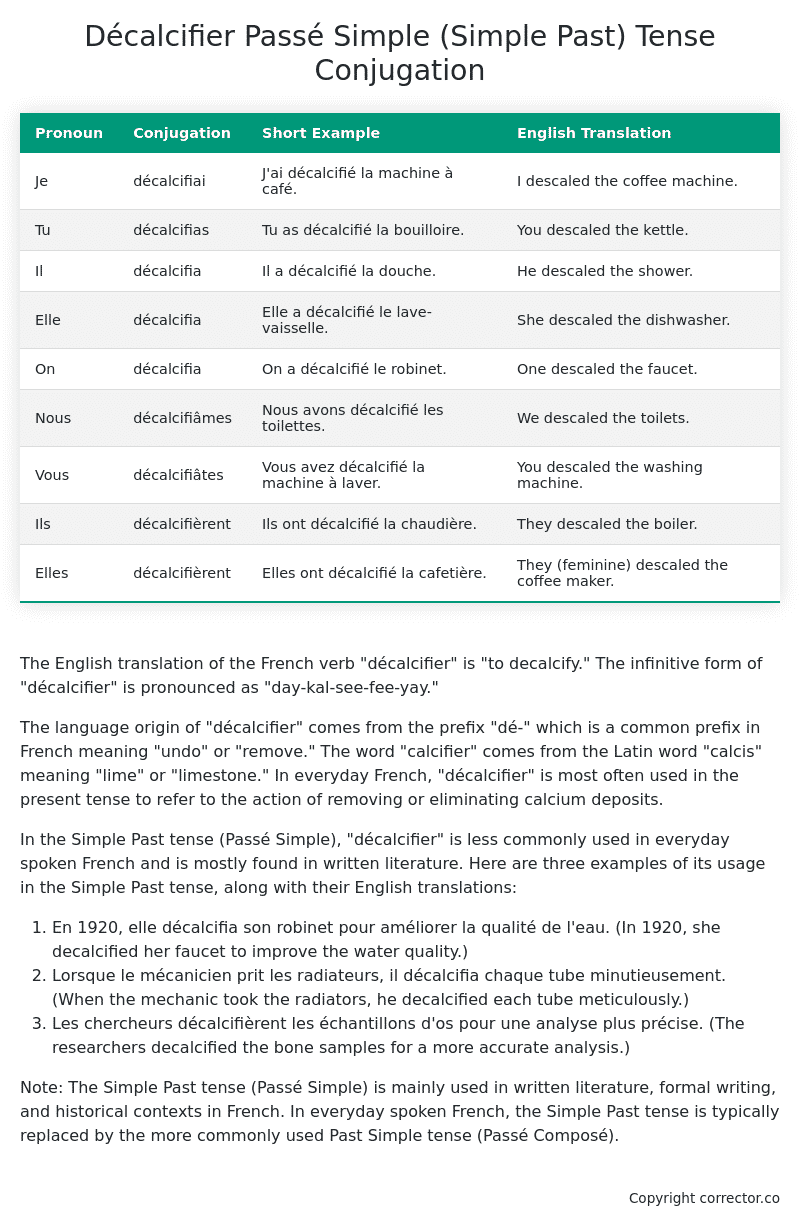Passé Simple (Simple Past) Tense Conjugation of the French Verb décalcifier
Introduction to the verb décalcifier
The English translation of the French verb “décalcifier” is “to decalcify.” The infinitive form of “décalcifier” is pronounced as “day-kal-see-fee-yay.”
The language origin of “décalcifier” comes from the prefix “dé-” which is a common prefix in French meaning “undo” or “remove.” The word “calcifier” comes from the Latin word “calcis” meaning “lime” or “limestone.” In everyday French, “décalcifier” is most often used in the present tense to refer to the action of removing or eliminating calcium deposits.
In the Simple Past tense (Passé Simple), “décalcifier” is less commonly used in everyday spoken French and is mostly found in written literature. Here are three examples of its usage in the Simple Past tense, along with their English translations:
- En 1920, elle décalcifia son robinet pour améliorer la qualité de l’eau. (In 1920, she decalcified her faucet to improve the water quality.)
- Lorsque le mécanicien prit les radiateurs, il décalcifia chaque tube minutieusement. (When the mechanic took the radiators, he decalcified each tube meticulously.)
- Les chercheurs décalcifièrent les échantillons d’os pour une analyse plus précise. (The researchers decalcified the bone samples for a more accurate analysis.)
Note: The Simple Past tense (Passé Simple) is mainly used in written literature, formal writing, and historical contexts in French. In everyday spoken French, the Simple Past tense is typically replaced by the more commonly used Past Simple tense (Passé Composé).
Table of the Passé Simple (Simple Past) Tense Conjugation of décalcifier
| Pronoun | Conjugation | Short Example | English Translation |
|---|---|---|---|
| Je | décalcifiai | J’ai décalcifié la machine à café. | I descaled the coffee machine. |
| Tu | décalcifias | Tu as décalcifié la bouilloire. | You descaled the kettle. |
| Il | décalcifia | Il a décalcifié la douche. | He descaled the shower. |
| Elle | décalcifia | Elle a décalcifié le lave-vaisselle. | She descaled the dishwasher. |
| On | décalcifia | On a décalcifié le robinet. | One descaled the faucet. |
| Nous | décalcifiâmes | Nous avons décalcifié les toilettes. | We descaled the toilets. |
| Vous | décalcifiâtes | Vous avez décalcifié la machine à laver. | You descaled the washing machine. |
| Ils | décalcifièrent | Ils ont décalcifié la chaudière. | They descaled the boiler. |
| Elles | décalcifièrent | Elles ont décalcifié la cafetière. | They (feminine) descaled the coffee maker. |
Other Conjugations for Décalcifier.
Le Present (Present Tense) Conjugation of the French Verb décalcifier
Imparfait (Imperfect) Tense Conjugation of the French Verb décalcifier
Passé Simple (Simple Past) Tense Conjugation of the French Verb décalcifier (You’re reading it right now!)
Passé Composé (Present Perfect) Tense Conjugation of the French Verb décalcifier
Futur Simple (Simple Future) Tense Conjugation of the French Verb décalcifier
Futur Proche (Near Future) Tense Conjugation of the French Verb décalcifier
Plus-que-parfait (Pluperfect) Tense Conjugation of the French Verb décalcifier
Passé Antérieur (Past Anterior) Tense Conjugation of the French Verb décalcifier
Futur Antérieur (Future Anterior) Tense Conjugation of the French Verb décalcifier
Subjonctif Présent (Subjunctive Present) Tense Conjugation of the French Verb décalcifier
Subjonctif Passé (Subjunctive Past) Tense Conjugation of the French Verb décalcifier
Subjonctif Imparfait (Subjunctive Imperfect) Tense Conjugation of the French Verb décalcifier
Conditionnel Présent (Conditional Present) Tense Conjugation of the French Verb décalcifier
Conditionnel Passé (Conditional Past) Tense Conjugation of the French Verb décalcifier
Conditionnel Passé II (Conditional Past II) Tense Conjugation of the French Verb décalcifier
L’impératif Présent (Imperative Present) Tense Conjugation of the French Verb décalcifier
L’impératif Passé (Imperative Past) Tense Conjugation of the French Verb décalcifier
L’infinitif Présent (Infinitive Present) Tense Conjugation of the French Verb décalcifier
L’infinitif Passé (Infinitive Past) Tense Conjugation of the French Verb décalcifier
Le Participe Présent (Present Participle) Tense Conjugation of the French Verb décalcifier
Le Participe Passé (Past Participle) Tense Conjugation of the French Verb décalcifier
Struggling with French verbs or the language in general? Why not use our free French Grammar Checker – no registration required!
Get a FREE Download Study Sheet of this Conjugation 🔥
Simply right click the image below, click “save image” and get your free reference for the décalcifier Passé Simple tense conjugation!

Décalcifier – About the French Passé Simple (Simple Past) Tense
Formation
Usage
Narration
Historical Context
Interactions with other tenses
Passé Composé
Imparfait
Conditional and Subjunctive
Summary
I hope you enjoyed this article on the verb décalcifier. Still in a learning mood? Check out another TOTALLY random French verb conjugation!


